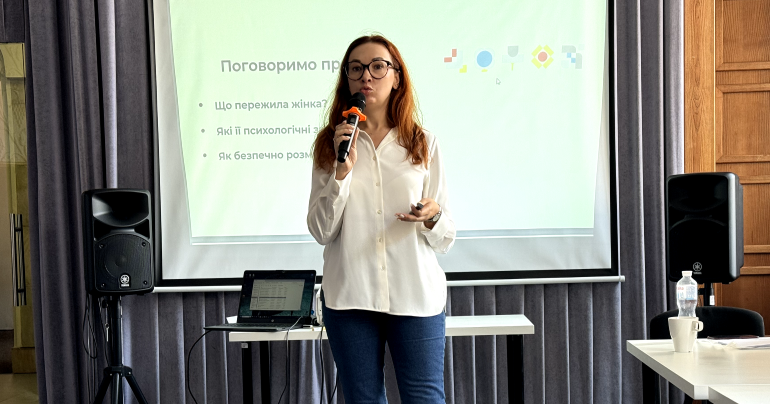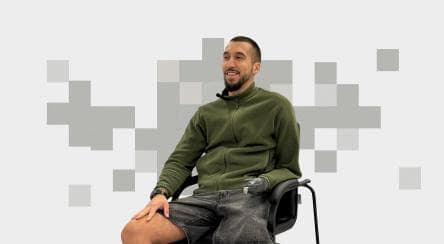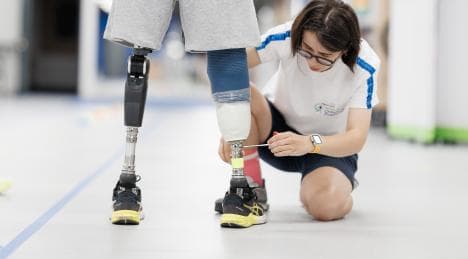On August 1, an educational training and conference for Ukrainian media representatives covering the topic of conflict-related sexual violence (CRSV) was held at the First Conference Hall in Kyiv. The event was organized and conducted by the National Union of Journalists of Ukraine with the support of the Dr. Denis Mukwege Foundation.
With the course of the war in Ukraine, the CRSV topic is gaining even more relevance. Meanwhile, most Ukrainian media either avoid this complex and sensitive topic or cover it in the wrong way. As a result, survivors do not receive adequate information through the media that could positively reinforce their intentions to report the crime and seek psychological help.
Training "Covering conflict-related sexual violence: what do journalists need to know?" is one of a series of educational events designed to raise the level of ethics and journalists’ professionalism in covering the topic of CRSV survivors in Ukraine.
During the training, the participants learned:
- Why does the topic of sexual violence become relevant in the conditions of war?
- What are the kinds of CRSV?
- Where to find topics and speakers?
- How to talk to victims of sexual violence?
- What ethical and legal aspects should journalists consider when working on this topic?
- What state institutions, international organizations, and public associations help victims of CRSV?
- Why should journalists dealing with survivors take care of their own mental health?
Among the speakers of the event were a human rights defender, journalist, communications director of the NGO "SEMA Ukraine", and a person who went through russian captivity Liudmyla Huseinova, a Ukrainian journalist, artist, participant of the professional protection program "Residence in Kosovo" about fixing a war crime in the form of violence Liudmyla Makei, as well as the Head of projects and programs of “Women's Aid” direction in the Future for Ukraine foundation, Anna Hrubaia.
Psychological aspects of journalists' work with victims of CVRC
Anna Hrubaia, as a therapist at the GIDNA project of free psychological assistance to women during the war, implemented by our foundation, spoke about the psychological aspects of journalists' work with survivors of CVRC and its witnesses.

Key points of the speech:
What does a woman who survived the CVRC feel?
- Guilt and shame encourage her to forget everything that happened.
- Feelings of anxiety turn on protective mechanisms.
- A woman can deny everything or convince herself that “it could have been worse”.
- Self-isolation or the search for a closed reality (phone, alcohol).
- A freeze response means a woman unconsciously returns to a time when everything was good in her life and immerses into this reality, instead of looking to the future development.
How to talk to a woman who survived the CVRC, safely?
- Choose a spacious room with a window for your conversation.
- Start the conversation with a simple question, "How are you?".
- Get to know each other. Show that you can be trusted.
- Talk ahead of time about the plan of your conversation i.e. the beginning, the conclusion, clear terms and conditions.
- Remind that the woman can stop the conversation at any time. The feeling of control over the situation is very important for her.
- Be an active listener.
- Do not judge her actions and unsolicited advice.
- Remember that the most important thing for a woman who survived sexual violence is safety.
The journalists noted that the material they heard was useful. Olena Khalik, editor-in-chief of the Novyny.LIVE website said: "For me and my colleagues it is crucial to understand the complex topics of covering war crimes. At this training, we received effective mechanisms and keys to communicate with women and men who have survived sexual violence. It was important to hear the psychological aspects pointed out by Anna Hrubaia. Now we have a clearer understanding of how to make materials related to this topic, how to plan a conversation, and even how to listen."
We thank our partners and the National Union of Journalists of Ukraine for organizing an important event that helps to form an ethical attitude towards people who survived sexual violence related to conflict in society and properly cover the problem in the media.




